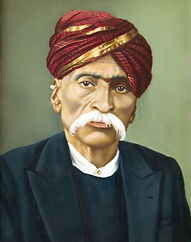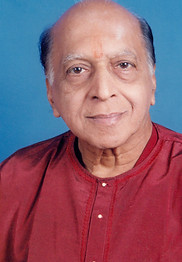
Guru Nana Saheb Panse

Pandit Shankar Bhaiya Ghorpadkar
Pandit Vasantrao Ghorpadkar


Pandit Ramakant Pathak
Nanasaheb Panse
When Pandit Kudau Singh was the undisputed emperor of Pakhavaj and it was believed none can even equal leave alone surpass the dizzy heights he had reached, Nanasaheb Panse emerged as a shining star in the world of pakhavaj. He took forward a different and highly refined and sober form of pakhavaj drumming which he learnt from several masters and mainly from the mystic artiste Madhav Swami of Alahabad. He started his training under Chande Bua of Satara and later from Manyaba Koditkar of Pune; both in, Maharashtra. He left home to reach Banares and for 12 long years learnt under the master Babu Jyot Singh. When his guru instructed him to go southward and take further training, he moved to Alahabad and met his ultimate mentor and the mysticMadhav Swami. Panse learnt everything that the Swami taught. The Swami tookJal Samadhi, but not before handing him over his own pakhavaj and manuscripts.He instructed Nanasaheb to preserve and disseminate the knowledge far and wide. Panse’s name spread all over the sub-continent. He was invited to Indore by Tukoji Holkar; a powerful member and general of the Holkar dynasty.Apart from preserving this ancient tradition, Panse affected changes in Pakhavaj drumming that enriched it in terms of sweetness and temporal complexity. It was he who gave the Indian percussion world the idea and a huge repertoire of Chakradhar.
Shankarbhaiya Ghorpadkar
Shankar Bhaiyya; the great grandfather of Nikhil Ghorpadkar initially took pakhavaj lessons from his father; Sakharam Ghorpadkar and tabla lessons from his elder brother Ganpatrao Ghorpadkar of Banares tradition. Shankar Bhaiyya who was also a Sarangee player once visited Indore and had a chance to listen to Nanasaheb Panse’s pakhavaj recital.
Highly impressed by Panse’s drumming, he decided not to return to Pune without learning from the master. He stayed back there for around six years and actualized his dream. Besides, he accompanied great dhrupad masters and others like Bhaskarbua Bhakhale, Vazebua, Bade Rahimat Khan, Miyan Jaan, Alladiya Khan, Balkrushnabua Ichalkarnjikar, Nathan Khan, Kale Khan, Barquatullah, Savai Gandharv, Rajabhaiya, Satariya Rahimat Khan, Faiyyaz Khan, Nissar Hussain, Vishnu Digambar, Murad Khan, Shankar Pandit, Abdul Karim Khan,Bal Gandharva, Master Krushna Rao, and Govindrao Tembe to name a few.Interestingly, he also played pakhavaj with Sama Gaan.
Pt. Vasantrao Ghorpadkar
Pt. Vasantrao Ghorpadkar (Pune. 1925 to 2011), learnt under his father Shankar Bhaiya and carried forward the Panse tradition. He became world famous through is world wide travels. He was awarded the Sangeet Natak Akademi Award, Dhrupad Kala Kendra (Bhopal) award, the Nanasaheb Panse Award (Indore) among several others. He accopanied the senior and junior Dagar Brothers, the late Ustad Zia Mohiuddin Dagar, Ustaad H Sayeeduddin Dagar, and others. He played for All India Radio for 50 long years and became a top radio artiste. He is credited and acclaimed for his stupendous efforts to preserve and bring forward the Panse tradition into the modern times, by teaching numerous students.
Pt. Rama Kant Pathak
Pt. Rama Kant Pathak was born in Gobardhanpur village, Azamgarh district, UP, on 1 November 1942, the second son of the late Pt. Ramdev Pathak. Beginning at age 14 he learnt from the celebrated pakhavaj player of the Nana Panse gharana, the late Padma Shri Pt. Sakha Ram. During this time he learnt roughly 3000 parans. In 1960-61, he placed first in the All India Music Competition, organized by Akashvani, New Delhi.
After the death of Pt. Sakha Ram, Ramakant Pathak began learning in 1973 with the great pakhavaj player of the Kudau Singh gharana, the late Padma Shri Pt. Ayodha Prasad, who taught him roughly 2000 choice compositions. This is why he is equally accomplished in both Nana Panse and Kudau Singh playing styles. Furthermore, he plays the compositions of the Haveli, Koriya, and Vishnupur traditions with equal skill. He has also learnt many compositions from celebrities such as the late Pt. Hari Shankar Mishra, the late Pt. Kanthe Maharaj, the late Guru Shambhu Maharaj, the late Ustad Ahmed Jan Thirakwa.




